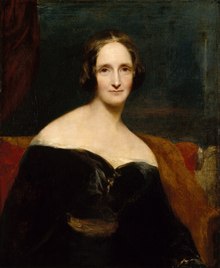19th Century Literature/Frankenstein
Mary Shelley's Frankenstein was first published in 1818, then later revised into the form we know it as today. One of the most notable differences was the change in Elizabeth's personal history from Victor's cousin to adopted orphan.
For more information on Mary Shelley, a plot summary of Frankenstein and its representation in the media check out their Wikipedia pages.
Narrative Structure
[edit | edit source]
The novel is structured as a frame narrative, opening and concluding with a letter written by Captain Walton, an arctic explorer who comes across Victor on the ice. He claims to be transcribing Victor's story as it is told to him, thus switching to Victor's perspective. Half way through Victor's narrative he describes a meeting with his creation, in which the creature tells his own life history to Victor. As Victor recounts this apparently word for word, we change perspectives again, creating a third layer within the narrative.
In this first sentence of letter one the information is that is read about is that the journey or quest that the speaker was on was successful so far. He is writing to someone who did not have a good insight on how this would end up. He is telling them you will rejoice, be happy because he has accomplished what they thought would be evil.
Characters
[edit | edit source]Victor Frankenstein
[edit | edit source]
Despite what Hollywood might have you believe, Victor is not a wholly evil character. The novel follows him from childhood and shows how his keen interest in science developed from studying ancient texts, in particular concerning alchemy. Science was his passion; he even delayed marrying Elizabeth and left his home to attend university and become a doctor. It is during his anatomy classes that he hits upon an idea that could bring life to dead flesh; just as an alchemist might create gold out of lead.
Despite building his creature out of the parts of executed criminals, Victor is so enamored with his own brilliance that he expects it to be beautiful, and envisions himself to be the god of a new race of people, free from the hardships of disease and aging. Victor always has the best intentions in his actions, but he fails to see his own limitations. When the creature is born hideous, instead of celebrating his success at creating life Victor is appalled and abandons it immediately.
From then on Victor is haunted by his creation. He tries to run from it and shuns it at every opportunity, but when it murders he is forced to confront it. The creature tells a sympathetic story of its abandonment and how being so frightening looking means it can never befriend ordinary people. Having no parent to guide it, the creature also has no morals so Victor fears it - sensing this the creature threatens Victor and commands him to build a female to act as wife to the creature.
About to enter a marriage himself Victor is terrified of what the creature might do to further injure his family. He agonizes over his decision, feeling that to create another creature, although within his power, would be an abomination. Victor is as much disturbed by his own power over nature as by the physical strength of the thing he has created. Ultimately his own moral compass takes over and he destroys the partially made female creature, costing him his own wife and future. In an attempt to right his wrongs against nature, Victor vows he will not rest until he has destroyed the monster he created.
The Creature
[edit | edit source]
The creature that Victor creates has frequently been misrepresented in films as a hulking, mute beast. Although initially abandoned by Victor, the creature learns to speak and read from observing a family teaching their children, watching them through a crack in the wall. Seeing his reflection in a river the creature is traumatized by his disfigured face and knows that he should not approach people. As well as reading the creature also plays an instrument, later telling Victor that his hand remembered the notes.
When Victor recounts the creature's monologue the creature is both articulate and sensitive. He feels keenly the abandonment of Victor, effectively his father, who did not even see fit to give the creature a name. In this, the creature can be seen as a symbol for disenfranchised people who are ignored or shunned by the upper class.
